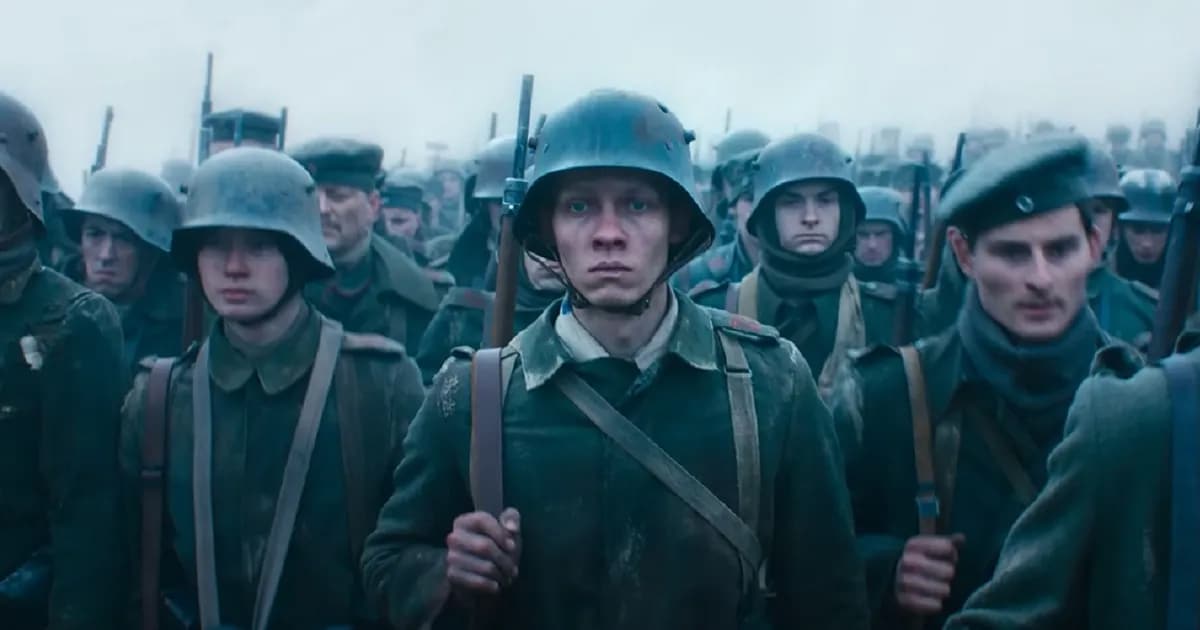With a back story as gripping as the production All Quiet on the Western Front could well repeat history and win big at the Oscars says CONSTANTINOS PSILLIDES
All Quiet on the Western Front made history at the BAFTAs last week by becoming the most decorated foreign film to win big at the prestigious ceremony. The German-language film won seven awards, including one for Best Movie, making it the frontrunner to sweep the Oscars, held on March 12.
The making of the movie is a movie in itself. Professional triathlete turned script-writer Lesley Patterson bought the rights to Erich Maria Remarque’s classic anti-war epic and tried to get funding to make the film for over 15 years. It was not meant to be, though, as the world was too preoccupied with superhero movies, too comfortable to pay attention to a gut-wrenching drama about WWI. Failing to get her pet project off the ground, Leslie risked losing the rights if she did not pay $9,000 for the option. Seeing no other alternative, she joined a triathlon race to use the first-place cash prize to renew her option. A race that she won, despite suffering a broken shoulder the day before, a true hero’s journey.
But that’s not the only fascinating story surrounding Remarque’s novel. This Netflix adaptation wasn’t the first time the German book made it to the big screen. Almost a century ago, the harrowing tale of Paul Baumer attracted the attention of Golden Era Hollywood, with Universal buying the rights and investing heavily in creating a sprawling cinematic masterpiece. The timing was perfect: the book tells the tale of young and idealistic Baumer, who joins the ranks of the German army, looking forward to combat glory, urged forward by militaristic propaganda and the glorification of war. Soon Baumer and his classmates discover the true face of war, witness the atrocities that come with combat and become disillusioned as their humanity slowly wastes away.
Since a decade had passed since WWI Universal felt that 1930 was the right time to produce an anti-war drama that condemned militarism and nationalism. The movie was a huge success, both critically and commercially, winning big at the Oscars, taking home the Best Director Award and the Outstanding Production Award, later renamed Best Picture. The critics and the audiences loved it, but there was one slight problem: the Nazis hated it.
Working off a message of militaristic propaganda, idealising war and German nationalism, Remarque’s realistic view of the war and the clear anti-establishment message did not sit well with Adolf Hitler or his future Minister for Propaganda Joseph Goebbels. The movie was everything the Nazis despised, and they made their dissatisfaction abundantly clear. The Nazi party has come off a stunning victory in recent elections, making them the second largest party in the country. As they continued to rise in power, they saw Remarque’s book and the movie based on it as a clear and present threat to their militarism rhetoric.
Despite objections, the movie was allowed to premiere under heavy police surveillance. Surmising that security measures would be laxer at future screenings, the party’s paramilitary arm, the Brownshirts, stormed the cinema, releasing mice, stinkbombs and beating up cinema-goers while screaming ‘Jewish film, Jewish film’. The cinema’s Jewish owner Hanns Brodnitz was arrested, only to later die at Auschwitz.
Goebbels railed against the movie in public and in private. His diary entry makes for a chilling yet illuminating read: Within ten minutes, the cinema resembles a madhouse. The police are powerless. The embittered crowd takes out its anger on the Jews. The first breakthrough in the West. ‘Jews out!’ ‘Hitler is standing at the gates!’ The police sympathise with us. The Jews are small and ugly. The box office outside is under siege. Windowpanes are broken. Thousands of people enjoy the spectacle. The screening is abandoned, as is the next one. We have won. The newspapers are full of our protest. But not even the Berliner Tageblatt dares to call us names. The nation is on our side. In short: victory!”
And victory he had. By the end of December, the German Censorship Board reversed its original decision to allow screenings of the movie and banned it. The author left the country less than three years later, realising that staying in Nazi-governed Germany would make him a target. Just like the movie, his hugely successful book was banned by then.
Almost 100 years later, a German language adaptation of the book is once again critically and commercially successful. Will it snag the Best Picture award as well? We will find out next Sunday.







Click here to change your cookie preferences